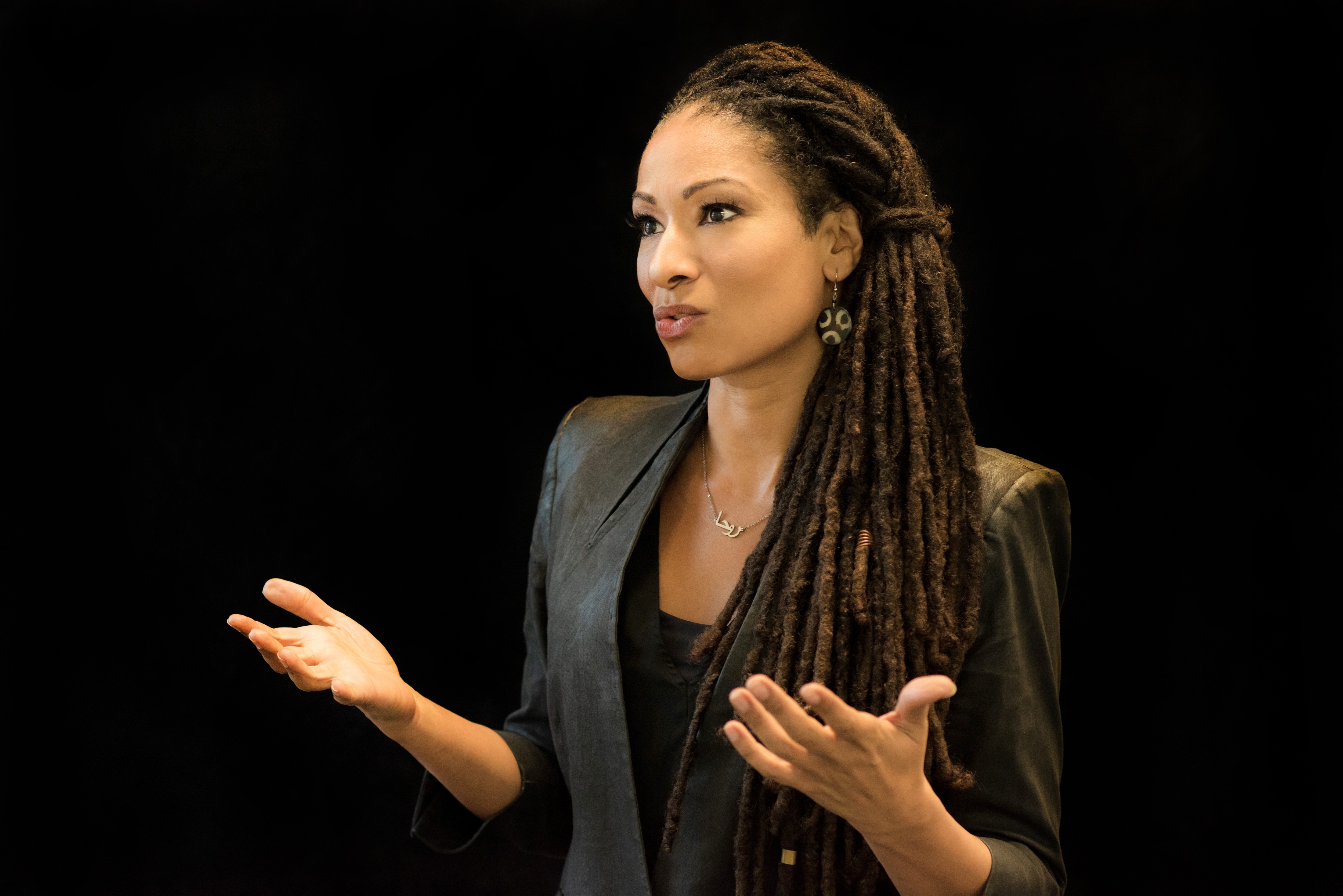Ruha Benjamin of Princeton University discusses her new book, "Viral Justice: How We Grow the World We Want," with Nicole Fleetwood of New York University. In-person and virtual.
This is a hybrid event, offered both in-person and virtually.
To register to attend in-person, click here or the button to the left.
To register to attend virtually via Zoom Webinar, click here.
From the publisher: "Long before the pandemic, Ruha Benjamin was doing groundbreaking research on race, technology, and justice, focusing on big, structural changes. But the twin plagues of COVID-19 and anti-Black police violence inspired her to rethink the importance of small, individual actions. Part memoir, part manifesto, 'Viral Justice' is a sweeping and deeply personal exploration of how we can transform society through the choices we make every day.
Vividly recounting her personal experiences and those of her family, Benjamin shows how seemingly minor decisions and habits could spread virally and have exponentially positive effects. She recounts her father’s premature death, illuminating the devastating impact of the chronic stress of racism, but she also introduces us to community organizers who are fostering mutual aid and collective healing. Through her brother’s experience with the criminal justice system, we see the trauma caused by policing practices and mass imprisonment, but we also witness family members finding strength as they come together to demand justice for their loved ones. And while her own challenges as a young mother reveal the vast inequities of our healthcare system, Benjamin also describes how the support of doulas and midwives can keep Black mothers and babies alive and well."
 Ruha Benjamin is an internationally recognized writer, speaker, and professor of African American Studies at Princeton University, where she is the founding director of the Ida B. Wells Just Data Lab. She is the award-winning author of "Race After Technology: Abolitionist Tools for the New Jim Code" and editor of Captivating Technology, among many other publications. Her work has been featured widely in the media, including the New York Times, the Washington Post, CNN, The Root, and The Guardian.
Ruha Benjamin is an internationally recognized writer, speaker, and professor of African American Studies at Princeton University, where she is the founding director of the Ida B. Wells Just Data Lab. She is the award-winning author of "Race After Technology: Abolitionist Tools for the New Jim Code" and editor of Captivating Technology, among many other publications. Her work has been featured widely in the media, including the New York Times, the Washington Post, CNN, The Root, and The Guardian.
 Nicole R. Fleetwood is the inaugural James Weldon Johnson Professor of Media, Culture, and Communication in the Steinhardt School at New York University. A MacArthur Fellow, she is a writer, curator, and art critic whose interests are contemporary Black diasporic art and visual culture, photography studies, art and public practice, performance studies, gender and feminist studies, Black cultural history, creative nonfiction, prison abolition and carceral studies, and poverty studies. Her most recent book is "Marking Time: Art in the Age of Mass Incarceration" (Harvard University Press, 2020), winner of numerous prizes. Among other exhibitions and public programs, she is also the curator of the traveling exhibition, "Marking Time: Art in the Era of Mass Incarceration," which debuted at MoMA PS1. The exhibition was listed as “one of the most important art moments in 2020” by The New York Times and among the best shows of the year by The New Yorker and Hyperallergic.
Nicole R. Fleetwood is the inaugural James Weldon Johnson Professor of Media, Culture, and Communication in the Steinhardt School at New York University. A MacArthur Fellow, she is a writer, curator, and art critic whose interests are contemporary Black diasporic art and visual culture, photography studies, art and public practice, performance studies, gender and feminist studies, Black cultural history, creative nonfiction, prison abolition and carceral studies, and poverty studies. Her most recent book is "Marking Time: Art in the Age of Mass Incarceration" (Harvard University Press, 2020), winner of numerous prizes. Among other exhibitions and public programs, she is also the curator of the traveling exhibition, "Marking Time: Art in the Era of Mass Incarceration," which debuted at MoMA PS1. The exhibition was listed as “one of the most important art moments in 2020” by The New York Times and among the best shows of the year by The New Yorker and Hyperallergic.
The author requests the following COVID Safety Protocols for in-person attendance:
1. Masks are encouraged and will be available at the event.
2. You can find best practices laid out by the CDC and state and local guidelines, here.
3. If you are not feeling well, we would be happy to switch your in person attendance to livestream and will share the livestream information with you.'
Please note: The library's "Black Voices Book Group" will be discussing the book during their November meeting.
The Community Room is wheelchair accessible. The room has an integrated audio induction/hearing loop system compatible with personal T-coil-enabled devices, and compatible headphone units are available for use during programs. English-language subtitles will be turned on for all films when available.
 Presented in partnership with Labyrinth Books and Princeton University Press and with support from the National Endowment for the Humanities. Any views, findings, conclusions or recommendations expressed in this programming do not necessarily represent those of the National Endowment for the Humanities.
Presented in partnership with Labyrinth Books and Princeton University Press and with support from the National Endowment for the Humanities. Any views, findings, conclusions or recommendations expressed in this programming do not necessarily represent those of the National Endowment for the Humanities.